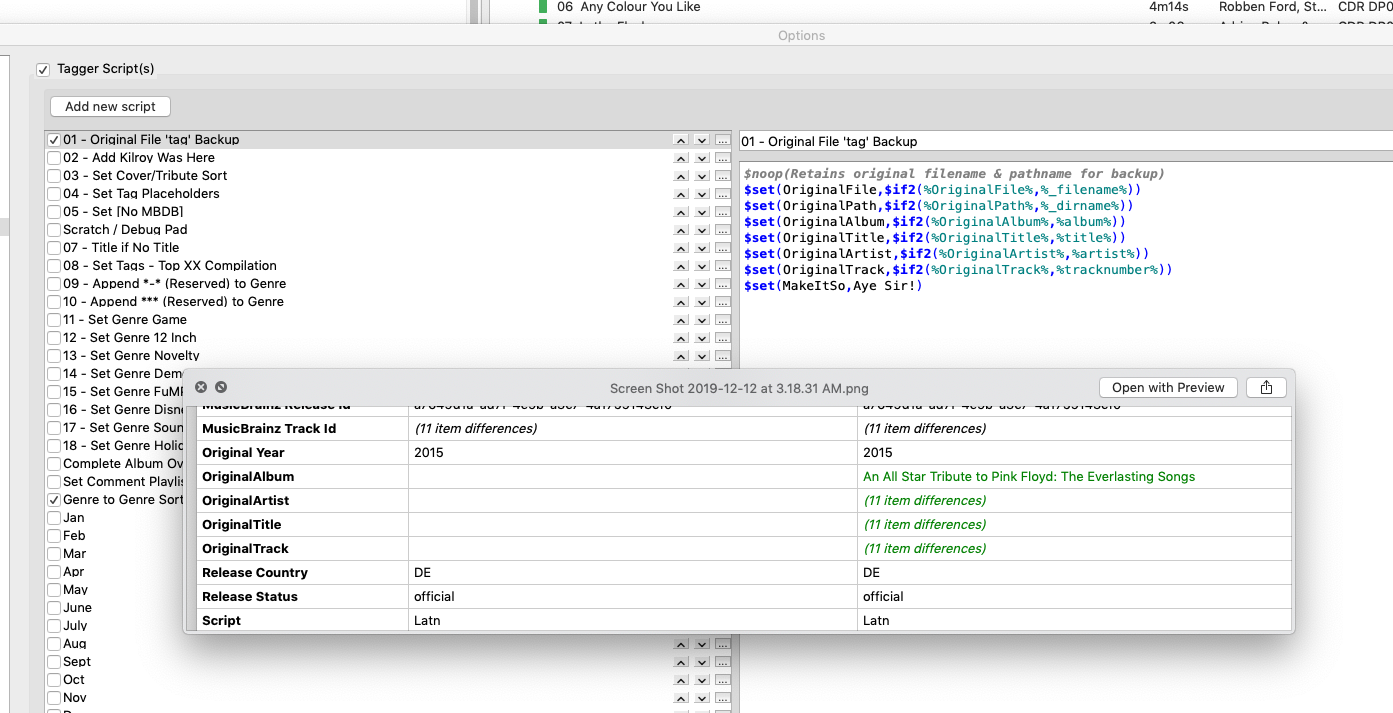- Musicbrainz Picard Tagger
- Picard Music Tagger
- Picard Mp3 Tagger Alternative
- Musicbrainz Picard Tagger Script
- Picard Tagger
Picard is a cross-platform music tagger. It is written in Python. Picard supports all popular music formats like MP3,M4A, FLAC, OGG, WMA, WAV, and many more. Another interesting feature of this is that Picard uses AcoustID audio fingerprints, which allows files to be. MusicBrainz Picard is a cross-platform music tagger. It has support for multiple audio file formats, CD lookups, AcoustID audio fingerprints, plugins, and more.
| Overview | Download | Components | Screenshots | Support | SDK |
MusicBrainz Tagger


By: MordredKLB
Allows tagging files using data from MusicBrainz.Features:
- Fetches data by automatically calculated MusicBrainz Disc ID, existing Artist/Album or MusicBrainz Album ID tags
- Uses the latest version of MusicBrainz web service, which corresponds to the NGS data model
- Supports many different tags, including artist, album, date, tracknumber/totaltracks, discnumber/totaldiscs, label, catalognumber, barcode etc.
- Supports MusicBrainz-specific tags: Artist ID, Album ID, Release Group ID, Disc ID, Track ID, album type, album status
- Missing TOCs can be submitted to MusicBrainz from the context menu.
Current version: 0.4.6, released on 2020-05-17
Change log:
Musicbrainz Picard Tagger
0.4.6 - 2020-05-17- Drastically sped up the speed of requests to MB by making API calls in separate threads. 1-sec between each request is still enforced due to MB API rate limit
- Added caching to all MB API calls. This required adding a Least Recently Used cache to the program, and then checking for the request in the cache before making a request to MB for the resource. The cache will hold 100 entries and entries get marked stale after 60 minutes.
- Added options to skip writing MB IDs for albumid, discid, trackid
- Search by release-group ID for those of us who don't write albumid
- Tagging dialog now usable on small resolution screens
Links
Download
View version history
Home page
Documentation
Discussion
Source code
More components
Browse all
Browse by author: MordredKLB
Tags: MusicBrainz, tagging
This section allows for the management of user-defined tagging scripts.
The “Tagger Script(s)” checkbox at the top of the page allows you to completely disable alltagging scripts. This can be useful when tracking down a problem with Picard’s configuration.
Picard Music Tagger
Below the checkbox are two columns showing the list of scripts in the left-hand column, withthe content of the selected script shown in the right-hand column. This section allows you toadd, remove and reorder the scripts, enable or disable individual scripts, as well as edit thecurrently selected script.
When the checkbox beside the script is checked, that script will be executed automatically, oncefor each track in the release, when Picard retrieves information for a release from the MusicBrainzwebsite. If the checkbox is left unchecked, then the script will not be executed automatically.
Picard Mp3 Tagger Alternative

Musicbrainz Picard Tagger Script
Regardless of whether or not the script is executed automatically, it can also be executed manuallyby right-clicking on an item in the clustering pane (middle pane) or the tagging pane (right-handpane) and selecting it from the list displayed when “Run Scripts” is selected. Ifa cluster is selected in the middle pane or a release is selected in the right-hand pane, the scriptwill be executed for each track in the selected cluster or release. If only a single track or fileis selected, then the script will only be executed for that track or file.
Picard Tagger
For additional information about scripting please see the “Scripts”and “Scripting” sections, as well as “Tags & Variables”.





